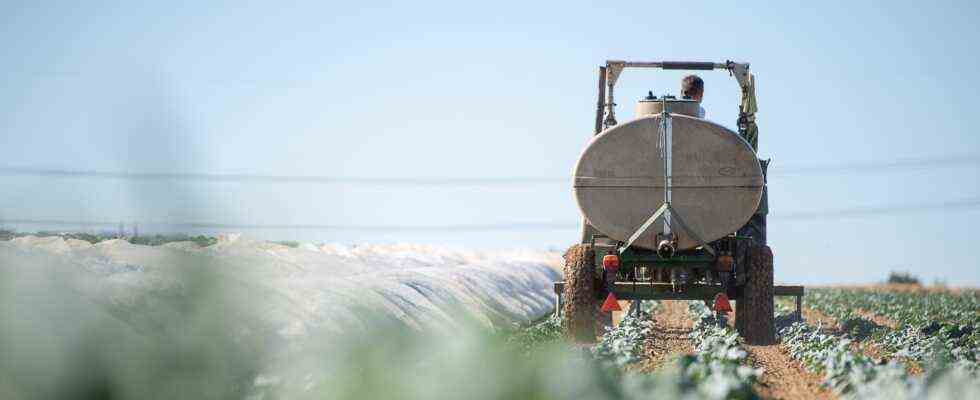Exclusive
Status: 14.09.2021 3 p.m.
Agriculture is a major contributor to climate change. Most of the agricultural subsidies have a negative impact. The UN is calling for a turnaround in order to achieve the sustainability goals by 2030.
Agriculture causes considerable problems in climate and environmental protection worldwide. That is the result of a new UN report published today which is the SWR already exists.
For the report, several UN organizations and numerous scientists have examined the effects of agriculture and, above all, agricultural policy on the environment. As a result, they give agriculture a very bad rating. This is mainly due to the wrong incentives and targets in the agricultural subsidies. These would continue to rise worldwide – with negative effects.
Billions in “harmful” subsidies
For example, 540 billion US dollars are distributed annually in direct and indirect agricultural subsidies. But 87 percent of this funding, or $ 470 billion, would have negative consequences for the population or the environment. The UN experts cite as examples that agricultural subsidies often lead to ecologically disadvantageous monocultures being grown on more and more areas in agriculture.
Monocultures, such as those often found in maize or rice cultivation, have come under fire because they can lead to a decline in biodiversity and a desertification of the landscape.
But according to the UN report, the current agricultural policy of many countries is causing more and more farmers all over the world to specialize in the cultivation of a few, lucrative varieties – namely those that receive the highest subsidies. This leads to the expansion of monocultures with their negative ecological consequences.
Too little sustainability in agriculture
According to the report’s authors, one is on the wrong course in order to achieve the UN goals for sustainable agriculture by 2030. In addition, existing funding programs would help protect these lucrative monocultures with even more pesticides, which also has negative effects on the environment.
The FAO, the Food and Agriculture Organization of the United Nations, collaborated on the report. Its general director, Qu Dongyu, appeals to the governments of the countries: “This report […] is a wake-up call for governments around the world to rethink their agricultural subsidies and transform agricultural systems so that we can make improvements: Better food, better production, better environment and better life. “
Environmental problems from wrong agriculture
The authors of the UN report also clearly criticize the current agricultural system with regard to the consumption of resources. Food production is “a skin pollutant of air and water”. In addition, the agricultural sector is the largest consumer of water, accounting for around 75 percent of the world’s freshwater consumption. The intensification of agriculture has led to “severe pollution of the land and seascape,” according to the report. This is mainly due to chemical pesticides and fertilizers as well as the excessive use of antibiotics.
Another problem that the report criticizes is the cost of pollution, the so-called “external cost”. If, for example, water is polluted with pollutants through a high use of fertilizers or pesticides, the costs are borne by the general public and not by the polluters.
This is also criticized by Tim Christophersen, head of the nature and climate protection department at the United Nations Environment Program (UNEP) SWR: “Agricultural products are produced with too much poison, too much energy and too many emissions, often on cleared land and with the bitter side effect that nutritional diseases are increasing sharply worldwide. All countries should improve this in order to use taxpayers’ money for effective climate protection and more nature , and thus to secure food for mankind in the long term through sustainable agriculture. “
Climate sinner agriculture
This also applies to greenhouse gases. From a global perspective, agriculture is one of the main causes of climate change. According to the Intergovernmental Panel on Climate Change (IPCC), agricultural production causes around 25 percent of man-made greenhouse gases. The report criticizes the wrong agricultural policy in many countries.
The greatest financial support would be given to those areas that generate a particularly large amount of greenhouse gases – above all meat, milk or rice. The current agricultural policy “works against the goals of the Paris climate protection agreement and our common future”, so the clear criticism in the UN report.
UN: System needs to be rebuilt
The experts have therefore formulated a clear requirement. The financial and tax subsidies in agriculture urgently need to be changed in order to steer production in the right direction. In principle, subsidies are a good way of controlling developments. However, the criteria would have to be changed. Sustainable, climate-friendly or ecological agriculture must be promoted much more than production methods that consume resources and pollute the climate and the environment.
The current report was produced under the lead responsibility of three UN organizations. Experts from the UN Environment Program (UNEP), the United Nations Development Program (UNDP) and the World Food Organization (FAO) were involved. The occasion of the report is the “Food System Summit” of the UN, which takes place next week in New York. The focus there is on converting the global food system into a sustainable economy.

